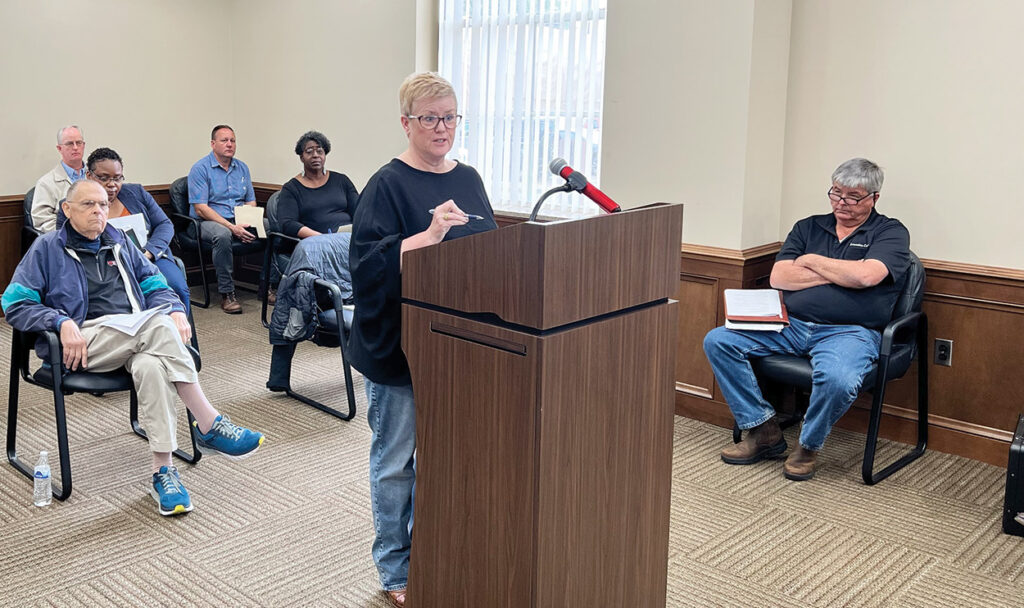The Lowndes County Board of Supervisors on Monday passed an ordinance banning tianeptine, commonly referred to as “Za-Za,” countywide.
Selling or possessing the drug carries a fine of $1,000 and up to six months in jail.
The ordinance goes into effect April 13 and bans the sale and possession of the drug until July 1, when a state law making it a Schedule 3 controlled substance goes into effect. The 10-day delay struck a compromise between declaring an emergency for an immediate ban and waiting the traditional 30 days for non-emergency ordinances to go into effect.
Supervisors held a public hearing on the ban, but the writing was on the wall from the beginning of the meeting.

“I think it’s a foregone conclusion that the board is planning on passing the ordinance,” District 5 Supervisor Leroy Brooks said. “The legislature has already passed a law. … (A ban) is going to happen, but we wanted to follow through on the public hearing.”
The supervisors heard brief remarks from citizen Glenn Lautzenhiser, who has been involved in getting both the city and county to pass bans, and family members of Christopher Montgomery, who passed away from an apparent overdose.
However, the path to enacting the ban did take some twists and turns during the discussion. Some board members wanted to ban Za-Za immediately, while others wanted to wait the traditional 30 days after passage before the ordinance went into effect.
“Since I’ve been on the board, every ordinance we’ve passed has been laid on the table for 30 days,” Brooks said. “We need to follow the procedure.”
Sheriff Eddie Hawkins didn’t want to wait.

“On the (ordinance banning) kratom, we didn’t do that,” Hawkins said. “It passed and went into effect that day.”
County Attorney Tim Hudson said the problem with an immediate ban was the fact that the ordinance also banned possession.

“The problem is not the stores, it’s making it illegal to possess,” he said. “If I’ve got it in my pocket and you put it into effect today, I am violating the law when I get up and walk out.”
Hudson suggested the board make a finding Za-Za is a public health emergency if it intended to circumvent the 30-day waiting period.
Brooks thought the supervisors needed to be more cautious.
“One or two cases (of overdoses) does not substantiate a crisis,” Brooks said. “… I know we’re trying to do something for the good of the community, but we don’t want to set precedents we’re going to have to deal with down the road. Tomorrow, if someone else comes in with something else, we’ve set a precedent.”
County Administrator Jay Fisher suggested toning down the language of the finding.

“As opposed to a health crisis, make a finding that it creates a public health danger,” Fisher said. “Don’t use ‘emergency’ or ‘crisis’ or any of those official terms.”
Hudson said the courts would not “second guess” the supervisors’ reasoning.
“They just want you to have some basis, and the testimony today is the basis,” Hudson said.
District 3 Supervisor John Holliman moved, with a second by District 1 Supervisor Harry Sanders, to ban tianeptine until July 1, with the ban going into effect on April 13. The motion passed unanimously.
The city of Columbus banned Za-Za at a Feb. 21 council meeting. That ordinance declared it a public health emergency and went into effect immediately.
Tornado shelters
In other business, District 4 Supervisor Jeff Smith suggested the county look at Federal Emergency Management Agency mitigation grants to build storm shelters.
The county does not have any dedicated public storm shelters currently, although Caledonia High School, New Hope High School and the Career Technology Center are all open to the public when school is not in session.

“I saw an article in the paper where the city is considering reaching out to a consultant to help them secure safe rooms and storm shelters for the city,” Smith said. “Is that something that we need to look at?”
Brooks suggested having Emergency Management Agency Director Cindy Lawrence come to the next meeting to talk about it.
“You’ve got (grants for) individual shelters and you’ve got public shelters,” Brooks said. “I think before we do anything we have (Lawrence) come and explain the options.”
Smith said he was getting a lot of questions about shelters in the wake of recent deadly tornadoes, including those that hit Rolling Fork and Monroe County last month.
“These storms are really making the conversation (about shelters) more of a conversation,” he said.
Smith asked that Lawrence come to the board’s April 17 meeting.
Brian Jones is the local government reporter for Columbus and Lowndes County.
You can help your community
Quality, in-depth journalism is essential to a healthy community. The Dispatch brings you the most complete reporting and insightful commentary in the Golden Triangle, but we need your help to continue our efforts. In the past week, our reporters have posted 46 articles to cdispatch.com. Please consider subscribing to our website for only $2.30 per week to help support local journalism and our community.







